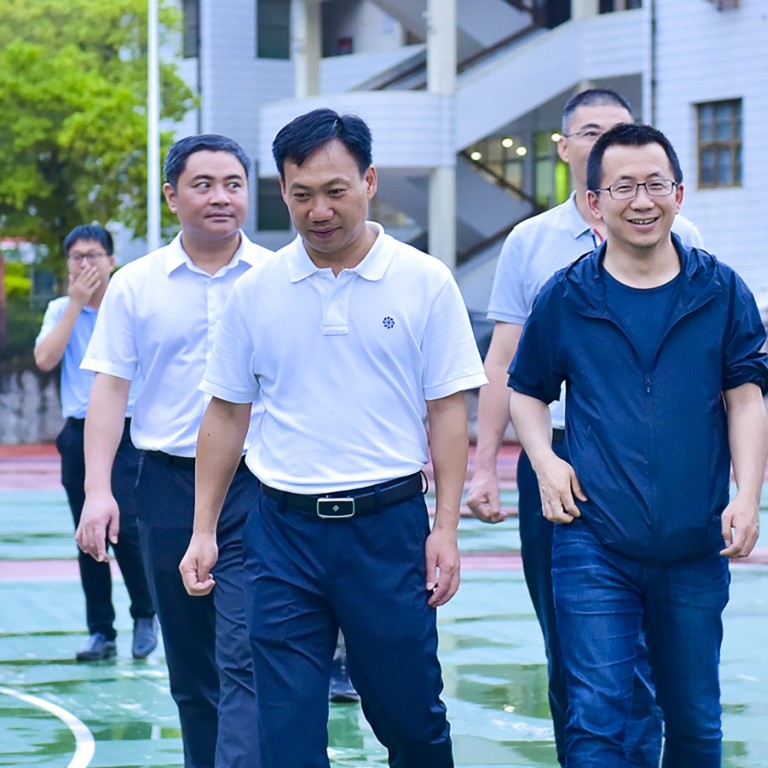
Book of social media quotes from TikTok owner Zhang Yiming becomes a must-read amid tech billionaire’s silence
- Both hard and soft copies of Zhang’s quotations are available on online marketplaces such as Taobao and Pinduoduo for up to 20 yuan a copy
- Zhang would post up to 10 times a day on Weibo in the early 2010s, talking about everything from his wife, his back pain, job postings, to book and film reviews
An unauthorised book recording TikTok owner Zhang Yiming’s social media posts between 2010 and 2016 has become popular online as Chinese netizens rush to get a glimpse of the young tech billionaire’s thinking at a time when he is maintaining a low profile.
Zhang, 38, is one of the most successful entrepreneurs in China after turning a start-up that began life in his small residential flat into global social media giant ByteDance within a decade. However, amid Beijing’s broad regulatory crackdown on Big Tech companies, Zhang stepped down from his role as chief executive in May to focus on “longer-term initiatives”.
The collection of more than 2,000 posts on Weibo, China’s Twitter-like social media platform, between 2010 and 2016 as ByteDance expanded rapidly, has become a must-have read for China tech aficionados as these posts are currently hidden from public view.
Both hard and soft copies of Zhang’s quotations are available on online marketplaces such as Alibaba Group Holding’s Taobao and Pinduoduo for up to 20 yuan (US$3.12) a copy. The items on Taobao, sold by only two merchants, saw a surge in sales last week according to customer review records. One buyer commented that the merchant “reacted fast” by providing the book and “must be an extraordinary business talent”. Alibaba owns the South China Morning Post.
ByteDance restructuring marks new era for the world’s biggest unicorn
Zhang – along with a string of other senior tech executives such as Alibaba co-founder Jack Ma and Tencent Holdings founder and CEO Pony Ma – has been largely absent from public view this year, aside from a photo in June when he visited his hometown Longyan to set up an education fund. This has been an about-turn for a man who used to be very active on social media.
Zhang would post up to 10 times a day on Weibo in the early 2010s, talking about everything from his wife, his back pain, job postings, to book and film reviews. He also shared information on public affairs including the missing Malaysian Airlines MH370 flight in 2014 and Beijing’s blocking of Gmail in 2011.
Other tech billionaires taking a break from the spotlight include Meituan’s CEO Wang Xing, who recently locked down his nearly 18,000 posts on Fanfou, a now obscure social media platform he created, after one of his posts angered Beijing.
TikTok owner embraces shorter ‘1075’ work hours amid 996 backlash
Zhang and Wang are frequently mentioned at the same time as they both grew up in the same coastal city of Longyan in Fujian province. Wang’s posts were more diverse than Zhang’s, covering philosophical and literary thoughts. Tech blogger Pan Luan, who has read books on social media postings by both, said that Zhang “focuses more on running a start-up company” while Wang “has more curiosity, who isn’t only the CEO of Meituan”.
Zhang interacted with Wang several times on Weibo, congratulating him in 2012 when Meituan’s monthly turnover surpassed 500 million yuan (US$78 million). He stopped posting on Weibo in 2016 and moved his sharing to ByteDance’s own news aggregator Jinri Toutiao before he also went quiet last May. Zhang subsequently made all his content on Weibo private, but he still has 156,000 followers.
“I believe in the aggregation, search, correlation and recommendation of information, which will have a huge [growth] space”, he posted in June 2010, when he was still cultivating his first start-up, real estate website 99fang.com.
China’s biggest online celebrity drags ByteDance into a fight with agent
The concept evolved into various ideas, such as in 2011 when Zhang thought about a tool that automatically links a candidate’s resume to his or her social networking accounts. He also said that the power of online advertising was not just about traffic, but how “accurately” the ads could reach target consumers.
The next year he noticed that people started to shift attention from screens outside lifts or in subway trains to their phones. That was when he founded ByteDance, whose TikTok and Douyin short video apps went on to gain around 2 billion users in the following years.
In other posts, Zhang describes himself as a technology person at heart who coded “for entertainment”. He also retweeted that diligence is “a state of mind”.
Zhang frequently rated other apps, speaking highly of WeChat’s global push as “the name, website and app are all good”, while complaining about Weibo’s verification code and Baidu Maps’ delayed signal that once caused him to miss a highway exit.

